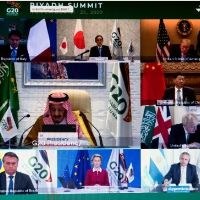(RIYADH) – At the weekend summit of the G20 countries, leaders expressed a commitment to coordinated global action to fight the COVID-19 pandemic, and support for the most vulnerable and fragile countries.
The G20 leaders were meeting in virtual format to address the way forward how to tackle together the ongoing COVID-19 pandemic, finance the development and deployment of a vaccine as well as continue the support to citizens and businesses struggling to cope with the aftermath of the pandemic.
On COVID-19, the EU championed a multilateral solution to the coronavirus pandemic. EU leaders called on the G20 to uphold and deepen its commitment to fight the COVID-19 crisis, notably by ensuring the affordable and equitable access for all people of diagnostics, therapeutics and vaccines. The Access to COVID-19 Tools Accelerator (ACT-A) initiative and its COVAX facility are the main tools to do so.
On climate change, the Summit agreed on a unified paragraph in the G20 Riyadh Declaration, after three consecutive G20 Summits where such consensus could not be reached. EU leaders urged all G20 members to work towards the full and effective implementation of the Paris Agreement. The EU also promoted a recovery based on green, inclusive, sustainable, resilient and digital growth in line with the 2030 Agenda and its Sustainable Development Goals.
On debt relief for the most fragile countries, Leaders reconfirmed their support through the G20 Debt Service Suspension Initiative that will provide debt relief and free resources to fight the pandemic. They committed to implementing the Debt Service Suspension Initiative (DSSI) including its extension through June 2021. EU leaders stressed that additional steps might be needed, and the Summit endorsed a common multilateral framework for further debt treatments.
On trade and taxation of the digital economy, Leaders recalled their support to the WTO reform process in the lead up to the 12th WTO Ministerial Conference and recognized the contribution that the Riyadh Initiative on the Future of the WTO has made. They also agreed to strive to find a consensus-based solution for a globally fair, sustainable, and modern international tax system by mid-2021, built on the ongoing work of the OECD.



